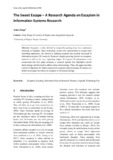Zitierlink:
http://dx.doi.org/10.25819/ubsi/2789Dateien zu dieser Ressource:
| Datei | Beschreibung | Größe | Format | |
|---|---|---|---|---|
| The_Sweet_Escape.pdf | 228.82 kB | Adobe PDF |  Öffnen/Anzeigen |
| Dokumentart: | InProceedings | Titel: | The sweet escape - A research agenda on escapism in information systems research | AutorInn(en): | Zeuge, Anna | Institut: | Forschungskolleg “Institute for Advanced Study” (FoKos) | Schlagwörter: | Eskapismus, Informationssystem, Forschungsagenda, Escapism, Information System, Research Agenda | DDC-Sachgruppe: | 004 Informatik | GHBS-Notation: | QGTX | Erscheinungsjahr: | 2020 | Publikationsjahr: | 2020 | Auch erschienen: | Radtke, Jörg (Hrsg.) ; Klesel, Michael (Hrsg.) ; Niehaves, Björn (Hrsg.): New perspectives on digitalization: Local issues and global impact. Siegen: Universitätsbibliothek Siegen, 2020. - DOI http://dx.doi.org/10.25819/ubsi/1894, S. 93 - 98 | Zusammenfassung: | Escapism is often defined as temporally getting away from unpleasant situations or thoughts. Since technology creates new opportunities to escape from something unpleasant, the interest in studying escapism has recently increased in information system (IS) research. However, despite growing interest on escapism, research is still in its very beginning stages. To explore IS phenomena more comprehensively this paper proposes a research agenda that highlights current shortcomings and the need to address these shortcomings. Thus, this paper provides a point of departure for future research on escapism and encourages IS-research to further investigate the effects of escapism in IS-related settings. |
DOI: | http://dx.doi.org/10.25819/ubsi/2789 | URN: | urn:nbn:de:hbz:467-16346 | URI: | https://dspace.ub.uni-siegen.de/handle/ubsi/1634 | Lizenz: | http://creativecommons.org/licenses/by-nc-nd/4.0/ |
| Enthalten in den Sammlungen: | Publikationen aus der Universität Siegen |
Diese Ressource ist urheberrechtlich geschützt. |
Seitenansichten
1.072
checked on 26.12.2024
Download(s)
3.046
checked on 26.12.2024
Google ScholarTM
Prüfe
Prüfe
Diese Ressource wurde unter folgender Copyright-Bestimmung veröffentlicht: Lizenz von Creative Commons


